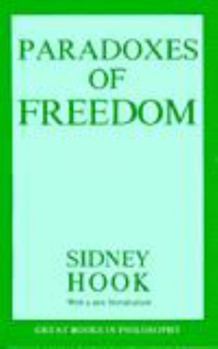The Paradoxes of Freedom
Select Format
Select Condition 
Book Overview
One of America's most influential social philosophers offers a restatement of traditional liberal-democratic views as they pertain to our constitutional form of government.The topics explored in Sidney Hook's book include the nature and extent of human freedom, the Bill of Rights, judicial review as it pertains to constitutional interpretation and the balance of powers among the three branches of government, censorship, freedom of speech, freedom...
Format:Paperback
Language:English
ISBN:0879754109
ISBN13:9780879754105
Release Date:September 1987
Publisher:Prometheus Books
Length:169 Pages
Weight:0.15 lbs.
Dimensions:0.4" x 5.4" x 8.6"
Customer Reviews
2 ratings
Begins a discussion that will last a lifetime
Published by Thriftbooks.com User , 20 years ago
This is more a long essay than a book, but it's an essay that you'll never forget. Sidney Hook was an educator by training, and this book offers an education in freedom, liberty, and the human condition in general. It's important to note, though, that this is a book written in a certain time. Sidney Hook was a leading anti-communist, and that perspective is clear throughout the book. With the fall of the Berlin wall, some of his writing may seem a bit old-fashioned, it's still relevant to our time.
Serious scholarship on American judiciary.
Published by Thriftbooks.com User , 22 years ago
As a lover of American law and a 'court-watcher', this title hooked me in immediately. Trying to find the balance between maximum democracy and learned aristocracy has always been a struggle so the main thesis should come as no suprise. Our constitution has rough edges. What is suprising is Hook's diagnosis.The first thing Hook does is to lambaste those who believe in absolute rights. The first and fifth amendment have clashed. The first amendment can even clash against itself and when these happen, one right must yield to the other. The bill of rights offers us no roadmap in how to decide this so Mr. Hook reaches for the first available solution- that of utilitarianism. I've always been skeptical of 'The greatest good for the greatest number. All others get screwed.' but sometimes it is unavoidable. Hook still seems too eager to use this 'quick-fix' to resolve the issue.Next, he goes on to textualism in the constitution. Like it or not, there is no text that conveys with ABSOLUTE CERTAINTY what it's author meant. Our constitution comes close. 'Congress shall make no law respecting the establishment of religion,' seems pretty clear on the surface but what constitutes a religion, is it a pre-existing establishment congress may not respect or simply their own establishment, and does this imply that congress may offer 'respect' to many religions thereby avoiding the problem by not showing preference to only one? Whew! Difficult stuff. At some point (godels proof), we have to rely on someone's interpretation. Who better than the supreme court? Here, the only skepticism I have is Hook's use of the 'Bork Method' of trying to figure out what the founders- He uses Jefferson and Madison- meant by quoting their personal letters. I know that Hook realizes there was more than two people's intentions, but you'd never think it.The point of disagreement I have with Mr. Hook is on judicial review. He's right, it's not authorized by the constitution, merely implied. But there are two extremes. One is congress as the final arbiter of which laws are constitutional an which aren't, or the courts could do it. Mr. Hook seems to trust the congress more than the courts. He does not recognize that the danger in democracy is that the people are generally short-sighted and are not likely to read the constitution closely (how many of your friends can name the first ten amendments?). The congress, being, through elections, directly accountable to the people, may not do what is in the best interest of the constitution if it will not help them get re-elected. With the supreme court there is not this difficulty, but another. They are not at all accountable to the people having been appointed for life. The only check on them is that they can only rule on cases brought to them (they must adhere to jurisdiction) but I'd rather the justices (who'se job it is to read the constitution) be safeguarding congress than congress do it themselves. We can either trust Scalia






